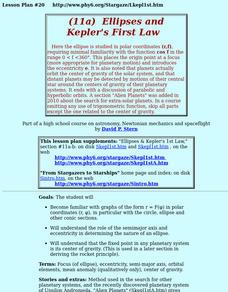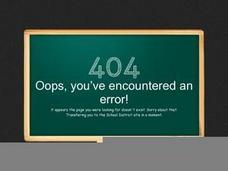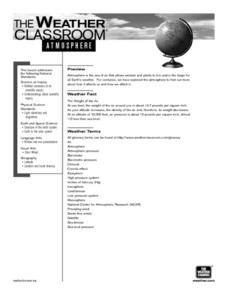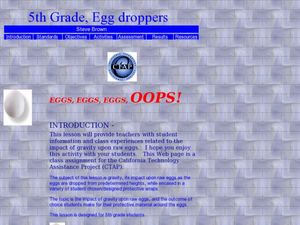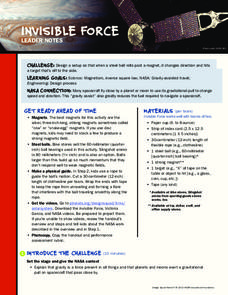Curated OER
Water Cycle Reading and Writing
Here is a great way to get pupils to express a scientific concept in a fun way. After hearing the story of Walter the Water drop and learning facts about the water cycle, the class will write a creative expository piece describing what...
Science 4 Inquiry
The Impact of the Sun and Moon on Tides
In 150 BC, Seleucus of Seleucia theorized that the moon causes the tides. Scholars learn about what causes tides by studying the interactions of gravity between the sun, moon, and Earth. They use technology to formalize otherwise...
Curated OER
Using the Internet
For this using the internet worksheet, students search several websites to review information about the heart, human senses, the solar system, and planets. Students also read information about the rock cycle and answer provided questions.
Curated OER
99.86% - Measuring Our Sun's Mass
Middle schoolers determine just how large the sun is. For this solar system lesson, students follow the prescribed steps to draw a box that represents the size of the sun and its mass compared to the entire solar system.
Curated OER
Knowledge Quiz: The Universe
In this universe quiz worksheet, learners complete a set of 10 multiple choice questions that cover a variety of concepts about the universe: constellations, black holes, the solar system, etc.
Curated OER
Is There a Tenth Planet?
In this planets worksheet, students read about how our solar system's planets were discovered and how scientist believe there might be a tenth planet. After reading, students complete 4 short answer questions.
Curated OER
Exploring the Water Cycle
The water cycle is one of earth's most easily observable processes, but demonstrating each step within classroom walls can be a challenge. Through a series of videos and quick demonstrations, cover each aspect of the hydrologic cycle in...
American Museum of Natural History
A Closer Look at Mars
A website looks at how we know so much about Mars—telescopes, robots, and spacecraft—and the search for martian life. Following the informational text are three questions that quiz pupils about possible life on Mars.
Curated OER
Working in Space
Students design and build one of three engineering problems dealing with living and working in space.
Curated OER
Life in Space: International Space Station
Young scholars explore the potential challenges of living in space. In this investigative instructional activity students search the Internet to locate 16 nations that are working together to build the Independent Space Station,...
Curated OER
Ellipses And Kepler's First Law
High schoolers explain that planets actually orbit the center of gravity of the solar system, and that distant planets may be detected by motions of their central star around the centers of gravity of their planetary systems.
Curated OER
Colonizing the Stars
Young scholars compare and contrast the size, composition and surface features of the nine planets of our solar system with the possible sizes and compositions of extra -solar planets.
Curated OER
Lesson-Mass and Weight
Student identify the three stationary positions, on the Earth, on the Moon, and in a house floating atop the cloud layers of Jupiter. They also identify the three orbiting positions, orbiting the Earth, orbiting the Moon, and orbiting...
Curated OER
Your Weight on Other Planets
Pupils explore their weight on other planets. In this science lesson plan, students view a presentation about the other planets and complete a worksheet in which they make predictions about their weight on the moon and other planets.
Curated OER
Travelogue of a Planet
High schoolers randomly select a planet, including Earth. They research key features of the planet including mass, volume, density, gravity, temperature, weather, geology, atmosphere, surface features, location from sun, Earth and other...
Curated OER
Suited for Space
A fantastic lesson on survival in outer space should excite your learners! Pupils explore the challenges that living, working, and surviving in space elicit. They focus on the spacesuit itself; how it protects astronauts, and enables...
Curated OER
The Weather Classroom - Atmosphere
Meteorology learners explore the weight of air, layers of the atmosphere, and air pressure action through a series of discussions, demonstrations, and hands-on group activities. Enough discussion prompts, background information, student...
Curated OER
Mars
After reading a short excerpt about the planet named after the Roman god of war, Mars, your class will answer four comprehension questions. The activity challenges them to fold over the paper and answer the questions without referring...
Curated OER
5th Grade, Egg Droppers
The classic "Egg Drop Activity" is described in this fine science lesson plan. Young scientists work together to design a container that will protect the eggs inside of it when dropped from a high place. Lots of good scientific...
PBS
Invisible Force
Investigate invisible forces. Young engineers design a setup that changes the direction of a steel ball using a magnetic force. The purpose of the setup is to model the gravitational pull of spacecraft by planetary bodies.
Discovery Education
Motion in the Ocean
How do temperature changes affect ocean currents? Scholars explore convection currents by demonstrating the flow of water in a baking dish. They use ice, heat, and food coloring to see currents. Then, they draw conclusions about their...
American Museum of Natural History
One-on-One With The Sun
Follow along as Stella Stardust interviews the sun. A fun and informative interview provides scholars with information about the sun.
DiscoverE
Touch Down
Protect the marshmallows! Groups create contraptions that will keep marshmallows in a cup, even after dropping them from a certain height. This is a fun way to model the shock-absorbing capabilities of spacecraft.
PBS
Inspector Detector
How do spacecraft detect magnetic fields? The fourth installment of a five-part unit has learners develop a device with magnets that allows for the detection of magnetic fields. They use a map of an imaginary planet to try out their...












